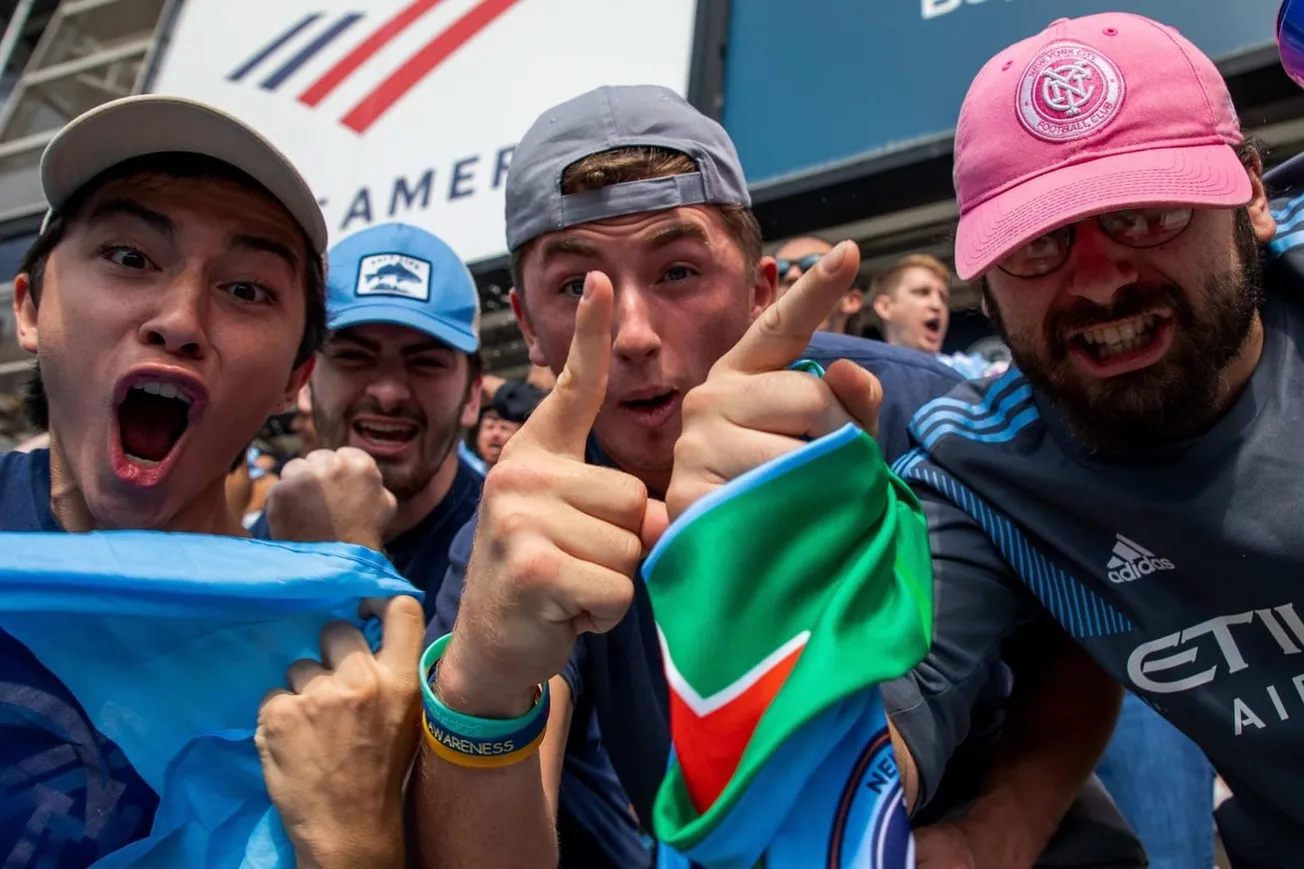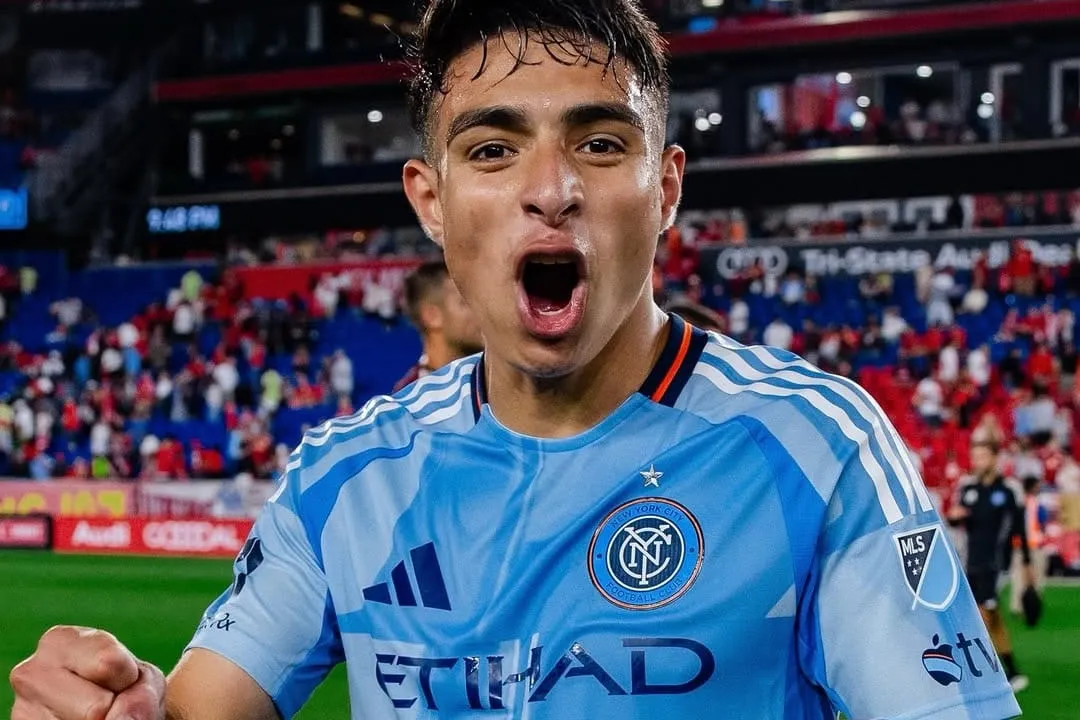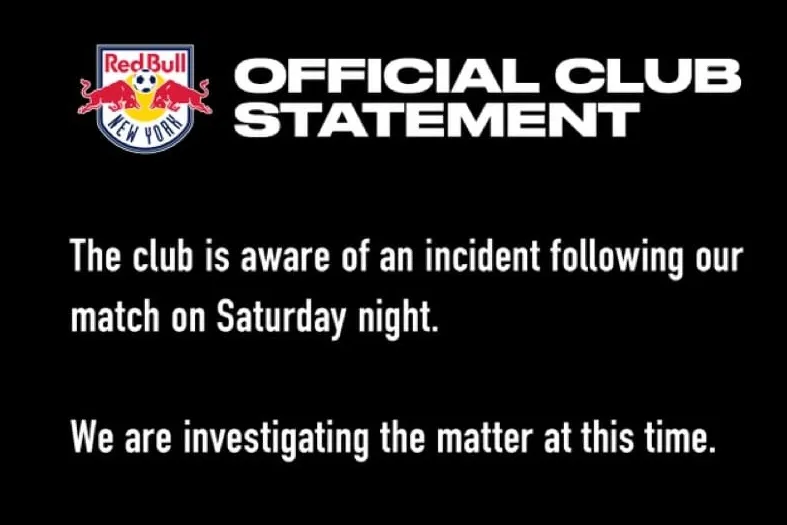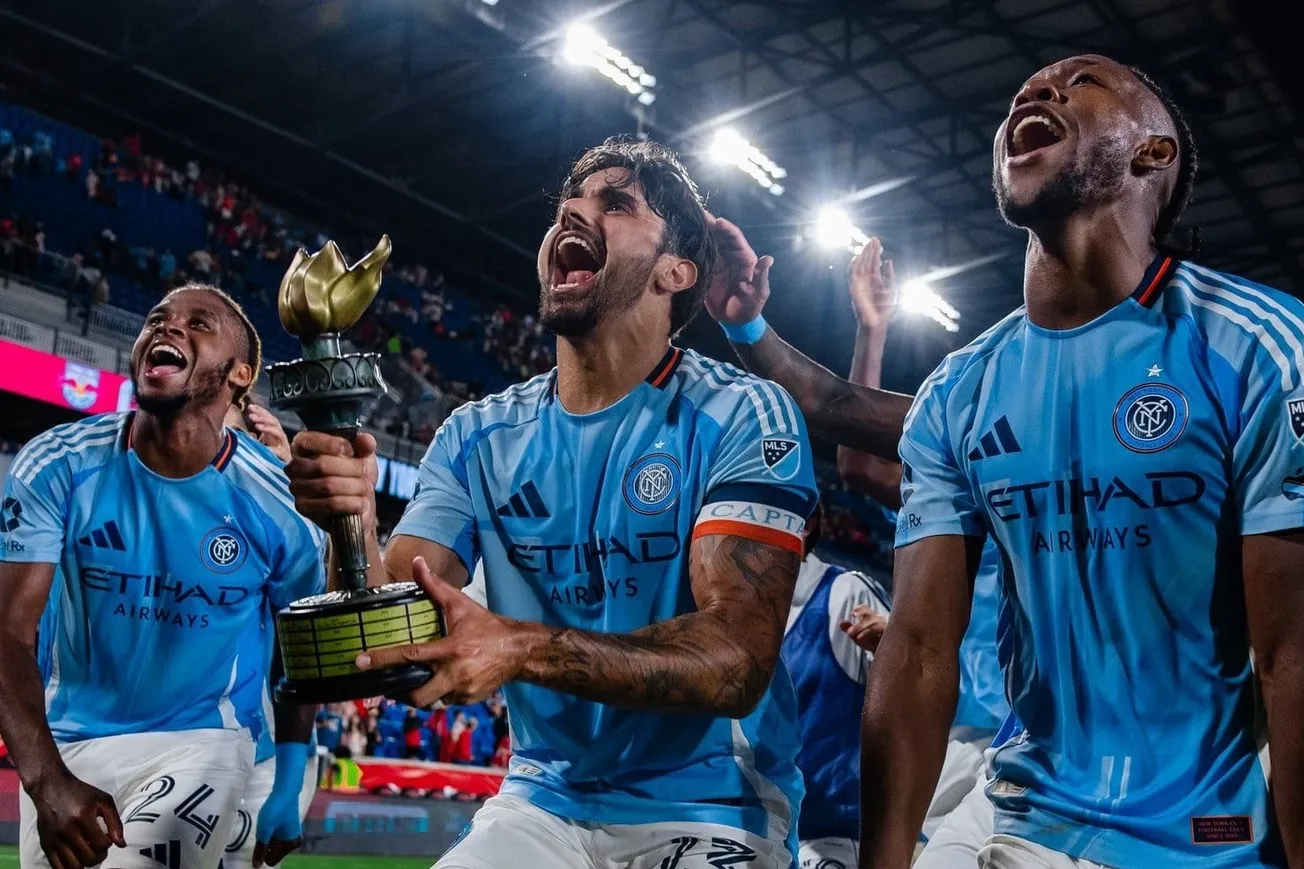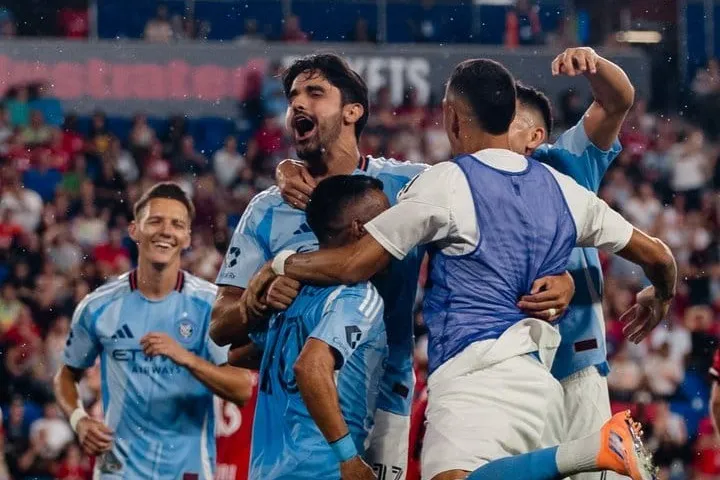Did you ever receive friend recommendations as a teenager? Your mother has an old friend visiting with her child, who’s “the same age as you” and “also likes video games.” You’re shooed up into your room with your new pal while your mother reconnects with her friend, and sit in silence as you unsurprisingly discover you have nothing in common.
Forced relationships rarely work out, and at times the Hudson River Derby feels like one.
History takes time
Major League Soccer is built on marketing, and because it was founded so late compared to other major American sports and foreign soccer leagues, the lack of history is compensated for by pushing narratives to the fans. The spectacles are exaggerated to compete for the American market’s attention, prompting things like “MLS After Dark” and the embrace of supposed chaos, the repeated fanfare over every foreign signing, and the strong emphasis on the league’s growth “against the odds.”
There are moments when you’re especially aware it’s happening and it becomes uncomfortable, just like when you’re sitting in your room trying to find something in common with that kid who will never become your friend. The league manufactures this drama to engage fans, and there’s nothing more dramatic than a good regional rivalry. When New York City FC joined the league in 2015 it was a time of joy for the suits in the New York offices of MLS as well as soccer fans in the largest media market in the country.
Before NYCFC’s arrival, there weren’t many natural rivalries in MLS. There was the Cascadia Cup, contested between the Portland Timbers, Seattle Sounders, and Vancouver Whitecaps, but that started in 2004, well before those teams joined MLS. The New York Red Bulls had a rival in DC United, which dated to the league’s early years. But no teams had the geographical proximity of NYCFC and the Red Bulls.
The league built up the rivalry in the hopes that the fans would arbitrarily dislike each other from the getgo and create a spectacle. Local derbies like the Old Firm in Scotland or Milan in Italy have passion after decades of battling for titles and bragging rights, and because of the powerful memories of prior encounters. But MLS couldn’t afford to wait for history to be made. They needed a marquee event right away.
One-sided results
If the first condition for a derby is history, the second is that it must be competitive. The Tyne-Wear derby between British sides Newcastle United and Sunderland was one of the world’s best, with the passion and vehement hatred shown by opposing fans and on the pitch perhaps unopposed in world soccer. But after Sunderland were relegated to the second division in 2017, and to the third the following year, the teams stopped meeting. Now the rivalry is practically irrelevant as Newcastle are literally classes above Sunderland.
The drama of the Hudson River Derby largely fell flat at first, largely because NYCFC simply weren’t that good. The Red Bulls were an established entity at that point, and the dominant MLS team in 2015. They won the Supporters’ Shield that year for the second time, having won their first just two years earlier in 2013. Fans in Harrison who had been around since theMetroStars era scoffed at the new boys on the block, and swatted them down in the three games they played that year, winning 2-1, 3-1, and 2-0. It wasn’t a derby as much as it was a three-part beat-down.
Plainly speaking, dominance isn’t fun. The Hudson River derby suffered in the early years because of that three-game sweep in 2015, and then in the (in)famous “Red Wedding” on May 21, 2016. NYCFC recorded their first derby win on July 3 of that year, but the Red Bulls won again just three weeks later. With five wins out of six games played over two years, they were comfortably the better team.
RELATED: The 50 most valuable soccer clubs in the world
RELATED: Power Ranking City Football Group’s 13 clubs
That started to change in 2017. The Red Bulls won the Supporters’ Shield in 2015, and finished first in the Eastern Conference in 2016, but NYCFC were close behind in second place that year. The two were separated by only three points. The following year NYCFC finished above the Red Bulls, and the Hudson River Derby became competitive. In 2017, NYCFC won twice, drew once, and lost once in the whopping four meetings between the two teams.
A genuine animosity started to form. Now that there was a foundation, the rivalry should have grown by leaps and bounds. It should have become more heated with every game, and by now it should be the biggest fixture of the year. But is it?
So little on the line
There’s no doubt that NYCFC fans turn out for the Hudson River Derby, especially the more recent matchups. It helps that New York City won both MLS league games against the Red Bulls last year, and logged their first victory over the Red Bulls at Red Bull Arena since 2018. But there’s an argument to be made that the Philadelphia Union are NYCFC’s more bitter rivals. The teams met in the Eastern Conference Finals of the MLS Cup Playoffs in 2021 and 2022, when the stakes were high. It helps that there is plenty of bad blood, and that Philadelphia fans live up to their reputation as the most hostile and resentful in America.
As for the Red Bulls? Ask the fans which teams they dislike most and NYCFC will come up, but it will be in the same breath as DC United and Philadelphia Union. Even Atlanta United and the Columbus Crew are mentioned.
These teams don’t make much geographical sense, but they have history and bad blood. The Red Bulls have a long rivalry with DC United that dates to the founding of the league, and they have played important competitive games against the Union (in the 2019 and 2021 MLS Cup Playoffs), Atlanta (in the 2018 Eastern Conference Final and Supporters’ Shield race), and Columbus (in the 2008 MLS Cup Final and 2020 MLS Cup Playoffs).
Put simply, NYCFC and the Red Bulls have never really had anything at stake when playing against each other. True, they have met three times in the US Open Cup, but neither team seems too troubled by that tournament. They have never met in the MLS Cup Playoffs, and have never played a game that could make or break a season.
RELATED: NYCFC defeat arrogant, ill-prepared Red Bulls
RELATED: All Hudson River Derby news
Even at times where one team felt some urgency, such as the most recent meeting at Yankee Stadium, when NYCFC were looking to put an end to their slump and secure a spot in the playoffs, the Red Bulls were already in the postseason and were looking for little but bragging rights. A rivalry goes from good to great when both teams are fighting on the big stage: Think of the title-defining battles of Barcelona and Real Madrid, or Boca Juniors and River Plate, or Manchester United and Liverpool. NYCFC and the Red Bulls have had their time at the top, but they have yet to meet in a crucial knockout setting.
The emotions of Hudson River Derbies rely on what occurs on the pitch, and without those extras the games have lacked bite. Players feel an added level of passion because of the enthusiasm in the stands, but when both fanbases haveturn their heads turned to other more natural rivals, the Hudson River Derby feels almost like an afterthought. When the league rather obviously tries to play the Derby up, the games can sometimes feel like your mother forcing you to bond with someone you don’t know.
What will it take?
Sir Alex Ferguson was a great man and one of the managerial greats, but in hindsight his “noisy neighbor” jibe goes down as one of the funniest quotes in soccer history. In 2009 Manchester United fans scoffed at the idea of a rivalry with Manchester City, dismissing them as unserious rivals. At that time, United were perennial winners under the Scottish manager, and City had only recently risen from the third division. Since then, Manchester City have rapidly risen to not only challenge Manchester United at the top, but to outright replace them.
Now the Manchester derby is one of the premier games in the league, and in the world.
Granted, the Mancunians have a lot more history together than the New Yorkers, but it still shows that even affairs that feel artificial for a while can eventually turn into the real thing. There’s a remarkable parallel to the Hudson River Derby: The red half of Manchester, with its history and success, are caught by the sky-blue club owned by City Football Group.
RELATED: Philadelphia hates you
RELATED: Vote for the best NYCFC goals of all time
The gambit of the MLS is to create an expansive soccer culture from scratch. The league has to play up every rivalry, no matter how irrelevant it may seem at first, in the hope that they will eventually become relevant. Your mother can’t make you become pals with her friend’s kid, but it could very well be that the two of you get along. Maybe not at first, but you might bond over a band, or a graphic novel, or a TV show.
And maybe, if two fanbases stare at each other across the Hudson River for long enough, they’ll learn to hate each other. Things like Heineken Rivalry Week can be irritating and painfully obvious, but they serve a purpose: To create emotion and excitement about these rivalry games until the emotion becomes an intrinsic part of the occasion, making it something truly special.
Fans from New York City are already passionate about the rivalry. If you give the somewhat nostalgic Red Bulls fans some time – and a game with stakes high enough to care about – then the Hudson River Derby could be one of the premier events in American soccer. For now the rivalry remains disappointing to some, but it still has plenty of room to grow in the years to come.

